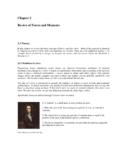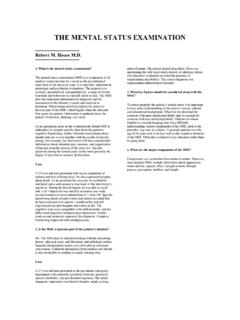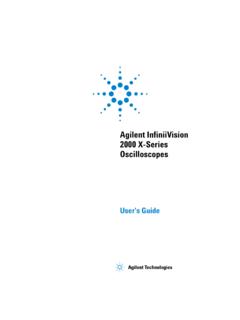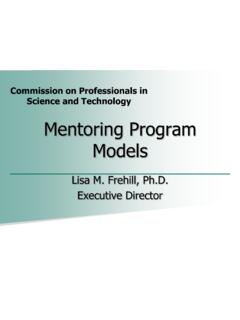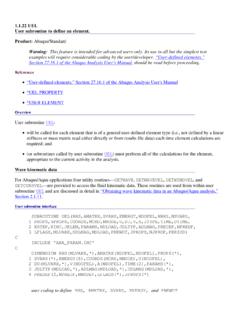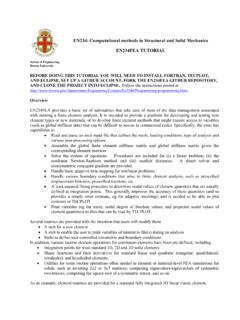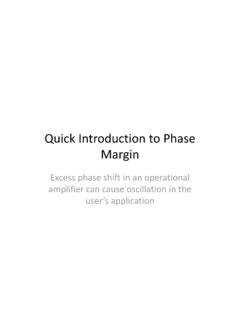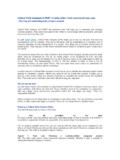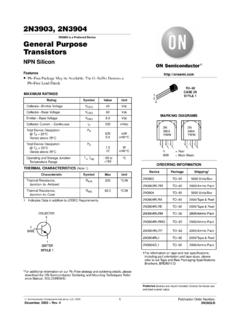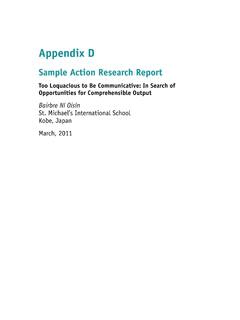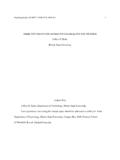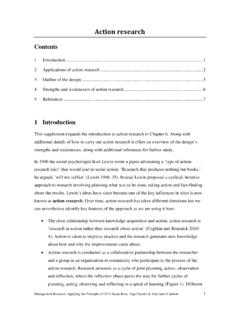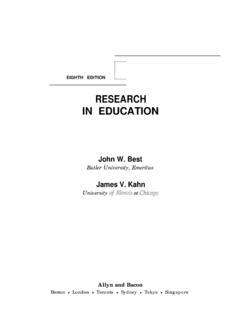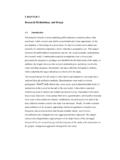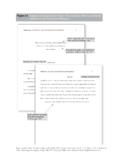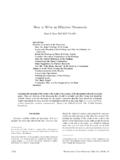Transcription of ACTION
1 A program of TheEducation AllianceTHEMES IN EDUCATIONACTION RESEARCHN ortheast and Islands Regional EducationalLaboratory At Brown Universityby Eileen FerranceACTIONRESEARCHN ortheast and Islands Regional EducationalLaboratory At Brown Universityby Eileen FerranceThe LAB, a program of The Education Alliance at BrownUniversity, is one of ten educational laboratories funded bythe Department of Education s Office of EducationalResearch and Improvement. Our goals are to improveteaching and learning, advance school improvement, buildcapacity for reform, and develop strategic alliances withkey members of the region s education and policy LAB develops educational products and services forschool administrators, policymakers, teachers, and parentsin New England, New York, Puerto Rico, and the VirginIslands. Central to our efforts is a commitment to equityand about LAB programs and services is availableby contacting:LAB at Brown UniversityThe Education Alliance222 Richmond Street, Suite 300 Providence, RI 02903-4226 Phone: (800) 521-9550E-mail: : (401) 421-7650 Copyright 2000 Brown rights publication is based on work supported by the Office ofEducational research and Improvement (OERI), Department ofEducation, under Contract Number RJ96006401.
2 Any opinions,findings, and conclusions or recommendations expressed in thismaterial are those of the authors and do not necessarily reflect theviews of OERI, the Department of Education, or any otheragency of the This SeriesThis is another edition in a series of Themes in Education booklets produced by the Northeast and Islands RegionalEducational Laboratory at Brown University. The topicsaddressed by these booklets are generated in response torequests for information from practitioners, parents, andother members of the public. Each booklet aims to presenta balanced view of its topic and a glimpse of how theapproach works in schools. Some discussions may lendthemselves to a state-by-state summary; others areillustrated by a series of vignettes that demonstrate thecentral concepts. For topics that are more global in nature,the booklet will cite a few illustrations within the regionor goal of this series is to provide resources containinguseful information on education-related topics of to other relevant resources, selected currentreferences, and ways to obtain more information areprovided in each of ContentsWhat is ACTION research ?
3 1 What is Not ACTION research ? .. 2 Types of ACTION research .. 3A Brief History .. 7 Steps in ACTION research .. 9 Benefits of ACTION research .. 13 Stories from the Field .. 16 Rebecca Wisniewski Lowell, Massachusetts ..16 Julie Nora Providence, Rhode 22 Frequently Asked Questions .. 26 Conclusion .. 29 How Do I Get More Information? .. 30 References .. 31 Additional Resources .. 33 INTRODUCTIONA ction research is one of those terms that we hear quiteoften in today s educational circles. But just what does itmean? If you ask three people to define ACTION research ,you may find yourself with three different , ACTION research is undertaken in a school is a reflective process that allows for inquiry and dis-cussion as components of the research . Often, actionresearch is a collaborative activity among colleaguessearching for solutions to everyday, real problems experi-enced in schools, or looking for ways to improve instruc-tion and increase student achievement.
4 Rather than dealingwith the theoretical, ACTION research allows practitioners toaddress those concerns that are closest to them, ones overwhich they can exhibit some influence and make are responsible for making more and moredecisions in the operations of schools, and they are beingheld publicly accountable for student achievement process of ACTION research assists educators in assessingneeds, documenting the steps of inquiry, analyzing data,and making informed decisions that can lead to booklet discusses several types of ACTION research ,its history, and a process that may be used to engageeducators in ACTION research . Two stories from the field,written by teachers about their own reflections on theprocess, are given as illustrations of ACTION Research1 What is ACTION research ? ACTION research is a process in which participants examinetheir own educational practice systematically and carefully,using the techniques of research .
5 It is based on thefollowing assumptions: Teachers and principals work best on problemsthey have identified for themselves Teachers and principals become more effectivewhen encouraged to examine and assess theirown work and then consider ways of workingdifferently Teachers and principals help each other byworking collaboratively Working with colleagues helps teachers andprincipals in their professional developmentAlthough there are many types of research that maybe undertaken, ACTION research specifically refers to adisciplined inquiry done by a teacher with the intent thatthe research will inform and change his or her practices inthe future. This research is carried out within the contextof the teacher s environment that is, with the studentsand at the school in which the teacher works onquestions that deal with educational matters at people who call for greater professionalization say(Watts, 1985, p.)
6 118)THEMES IN EDUCATION2that teachers should be constantly researching andeducating themselves about their area of expertise, this isdifferent from the study of more educational questionsthat arise from the practice of in the term ACTION research is the idea thatteachers will begin a cycle of posing questions, gatheringdata, reflection, and deciding on a course of ACTION . Whenthese decisions begin to change the school environment,a different set of circumstances appears with differentproblems posed, which require a new look. Indeed, manyaction research projects are started with a particularproblem to solve, whose solution leads into other areasof study. While a teacher may work alone on these studies,it is also common for a number of teachers to collaborateon a problem, as well as enlist support and guidance fromadministrators, university scholars, and others.
7 At times,whole schools may decide to tackle a school-wide studyto address a common issue, or join with others to look atdistrict-wide is Not ACTION research ? ACTION research is not what usually comes to mind whenwe hear the word research . ACTION research is not alibrary project where we learn more about a topic thatinterests us. It is not problem-solving in the sense of tryingto find out what is wrong, but rather a quest forknowledge about how to improve. ACTION research is notabout doing research on or about people, or finding allavailable information on a topic looking for the correctAction Research3answers. It involves people working to improve their skills,techniques, and strategies. ACTION research is not aboutlearning why we do certain things, but rather how we cando things better. It is about how we can change ourinstruction to impact of ACTION ResearchPart of the confusion we find when we hear the term ACTION research is that there are different types of actionresearch depending upon the participants involved.
8 A planof research can involve a single teacher investigating anissue in his or her classroom, a group of teachers workingon a common problem, or a team of teachers and othersfocusing on a school- or district-wide teacher research usually focuses on a single issuein the classroom. The teacher may be seeking solutionsto problems of classroom management, instructionalstrategies, use of materials, or student learning. Teachersmay have support of their supervisor or principal, aninstructor for a course they are taking, or parents. Theproblem is one that the teacher believes is evident in hisor her classroom and one that can be addressed on anindividual basis. The research may then be such that theteacher collects data or may involve looking at studentparticipation. One of the drawbacks of individual researchis that it may not be shared with others unless the teacherchooses to present findings at a faculty meeting, make aformal presentation at a conference, or submit writtenmaterial to a listserv, journal, or newsletter.
9 It is possibleTHEMES IN EDUCATION4for several teachers to be working concurrently on thesame problem with no knowledge of the work of ACTION research may include as few as twoteachers or a group of several teachers and others interestedin addressing a classroom or department issue. This issuemay involve one classroom or a common problem sharedby many classrooms. These teachers may be supported byindividuals outside of the school, such as a university orcommunity partner. The LAB at Brown has just such arelationship with several research focuses on issues common to all. Forexample, a school may have a concern about the lack ofparental involvement in activities, and is looking for a wayto reach more parents to involve them in meaningful , the school may be looking to address its organizationaland decision-making structures.
10 Teams of staff from theschool work together to narrow the question, gather andanalyze the data, and decide on a plan of ACTION . Anexample of ACTION research for a school could be toexamine their state test scores to identify areas that needimprovement, and then determine a plan of ACTION toimprove student performance. Team work and individualcontributions to the whole are very important, and it maybe that problem points arise as the team strives to developa process and make commitments to each other. Whenthese obstacles are overcome, there will be a sense ofownership and accomplishment in the results that comefrom this school-wide Research5 District-wide research is far more complex and utilizesmore resources, but the rewards can be great. Issues canbe organizational, community-based, performance-based,or processes for decision-making.
